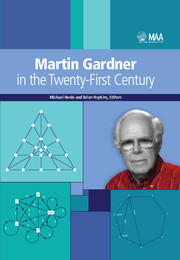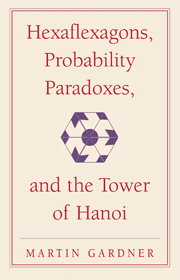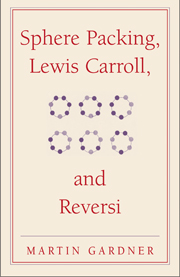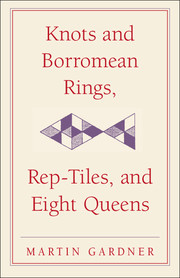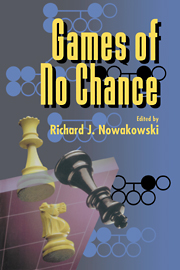Martin Gardner in the Twenty-First Century
The prodigious writings of Martin Gardner, from his Mathematical Games column in Scientific American to the 70-plus books he authored, had an enormous influence on the field of recreational mathematics. This book collects articles Gardner wrote for the MAA in the twenty-first century, together with other articles the MAA published from 1999 to 2012 that are inspired by his work. Eight of Gardner's articles are presented here: together they represent his playful and engaging approach to recreational mathematics, and the breadth of his interests, spanning geometry, number theory, graph theory, probability, and pseudo-science. The remaining 33 chapters are a diverse collection of responses to Gardner's work, many of which address open problems. This book is a tribute to the deep and lasting impact of a prolific and brilliant writer. It is for anyone who, like Martin Gardner, loves mathematics.
- A volume dedicated to a world-famous recreational mathematician
- The chapters within cover the breadth of Gardner's interests
- An inspiring and entertaining book for anyone who loves mathematics
Reviews & endorsements
'I think no lover of Martin Gardner topics can afford not to add this book to his or her collection.' The European Mathematical Society (euro-math-soc.eu)
Product details
October 2011Paperback
9780883859131
308 pages
253 × 178 × 15 mm
0.55kg
211 b/w illus. 13 tables
Available
Table of Contents
- Preface
- Part I. Geometry:
- 1. The asymmetric propeller Martin Gardner
- 2. The asymmetric propeller revisited Gillian Saenz, Christopher Jackson, and Ryan Crumley
- 3. Bracing regular polygons as we race into the future Greg W. Frederickson
- 4. A Platonic Sextet for Strings Karl Schaffer
- 5. Prince Rupert's rectangles Richard P. Jerrard and John E. Wetzel
- Part II. Number Theory and Graph Theory:
- 6. Transcendentals and early birds Martin Gardner
- 7. Squaring, cubing, and cube rooting Arthur T. Benjamin
- 8. Carryless arithmetic mod 10 David Applegate, Marc LeBrun and N. J. A. Sloane
- 9. Mad tea party cyclic partitions Robert Bekes, Jean Pedersen and Bin Sha
- 10. The continuing saga of snarks Sarah-Marie Belcastro
- 11. The map-coloring game Tomasz Bartnicki, Jaroslaw Grytczuk, H. A. Kierstead and Xuding Zhu
- Part III. Flexagons and Catalan Numbers:
- 12. It's okay to be square If you're a flexagon Ethan J. Berkove and Jeffrey P. Dumont
- 13. The V-flex, triangle orientation, and Catalan numbers in hexaflexagons Ionut E. Iacob, T. Bruce McLean and Hua Wang
- 14. From hexaflexagons to edge flexagons to point flexagons Les Pook
- 15. Flexagons lead to a Catalan number identity David Callan
- 16. Convergence of a Catalan series Thomas Koshy and Z. Gao
- Part IV. Making Things Fit:
- 17. L-tromino tiling of mutilated chessboards Martin Gardner
- 18. Polyomino dissections Tiina Hohn and Andy Liu
- 19. Squaring the plane Frederick V. Henle and James M. Henle
- 20. Magic knight's tours John Beasley
- 21. Some new results on magic hexagrams Martin Gardner
- 22. Finding all solutions to the magic hexagram Alexander Karabegov and Jason Holland
- 23. Triangular numbers, Gaussian integers, and KenKen John J. Watkins
- Part V. Further Puzzles and Games
- 24. Cups and downs Ian Stewart
- 25. 30 years of Bulgarian solitaire Brian Hopkins
- 26. Congo bongo Hsin-Po Wang
- 27. Sam Loyd's courier problem with Diophantus, Pythagoras, and Martin Gardner Owen O'Shea
- 28. Retrolife and the pawns neighbors Yossi Elran
- 29. RATWYT Aviezri Fraenkel
- Part VI. Cards and Probability
- 30. Modeling mathematics with playing cards Martin Gardner
- 31. The probability an amazing card trick is dull Christopher N. Swanson
- 32. The Monty Hall problem, reconsidered Stephen Lucas, Jason Rosenhouse and Andrew Schepler
- 33. The secretary problem from the applicant's point of view Darren Glass
- 34. Lake Wobegon dice Jorge Moraleda and David G. Stork
- 35. Martin Gardner's mistake Tanya Khovanova
- Part VII. Other Aspects of Martin Gardner:
- 36. Against the odds Martin Gardner
- 37. A modular miracle John Stillwell
- 38. The golden ratio—a contrary viewpoint Clement Falbo
- 39. Review of The Mysterious Mr. Ammann by Marjorie Senechal Philip Straffin
- 40. Review of PopCo by Scarlett Thomas Martin Gardner
- 41. Superstrings and Thelma Martin Gardner
- Index
- About the editors.

